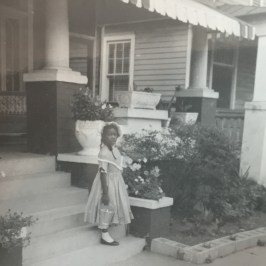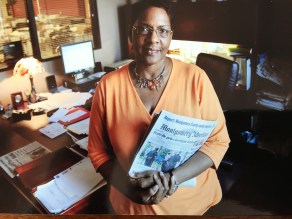
- This is me dressed as a milkmaid (for some program at school, no doubt) on the steps of my grandmother’s house in Savannah
I grew up in Savannah, in Georgia’s coastal area, at a time when there were two societies — one black and one white. It would take me decades to learn just how different these societies were. Ironically, a white author named John Berendt would blow the cover off of Savannah’s white society in 1994 when his book “Midnight in the Garden of Good and Evil” bounded onto The New York Times Best Sellers list, and stayed there for a record-breaking period of more than four years, a distinction that stands to this day. The book became a popular movie in 1997.
“Midnight” or “The Book” as people in Savannah still refer to Berendt’s work, used a variety of eccentric personalities to tell the story of a local murder and the several court trials of suspect Jim Williams, a white male socialite who was ultimately acquitted. While that book’s intrigue was enough to keep the reader glued to the pages, the real story for some of us was the way, in decades past, certain people in Savannah had advantages of wealth, safely protected neighborhoods with nearby amenities, quality education, grand cultural venues and high-society balls that celebrated life’s milestones. As African Americans, we had our own cultural opportunities — albeit less grand — but the white world we read about in “The Book” was a world most of us didn’t know about, didn’t think about and probably didn’t care about.
As African Americans, we lived in an isolated world, in communities where our neighbors were a mixture of those who were college educated and those who didn’t make it all the way through high school. We happily coexisted in supportive ways. We lived in communities where some households were led by women who were educators and men who wore uniforms to work; a community where teachers really cared about us with strict expectations for academic success, but who were forced to teach in substandard facilities with hand-me-down books and furniture carted over from white schools.
But then, when I think about the fact that I was born less than a century ago, just 84 years after slavery was legally abolished in the United States, I am shaken by the reality that the nation was still in a state of brokenness when it came to racial healing.
In the 21st Century, we are still in a state of racial brokenness. In other ways, life is so much better.
I stepped into adulthood crossing the bridge between full segregation in the South and the Civil Rights Movement led by Dr. Martin Luther King, Jr., I attended some of the Movement’s mass meetings at churches in Savannah and later as a college student in Atlanta, I had the chance to see Dr. King speak at a packed and rousing Sunday evening service at Mt. Moriah Baptist Church, across the street from Morehouse College. The Civil Rights Movement left me appreciative of the right to worship God without fear of reprisal, to vote without fear of sanction, grateful for the five freedoms in the First Amendment and the ability to celebrate the fact that I could go to any school or work in any place where I am qualified to be there.
Some members of my own family suffered the indignities of segregation. Others joined the NAACP and became part of the solution. When the time came for me to vote, I couldn’t wait to register, and I have never not voted in a local, statewide or national election in the eight states in which I have worked and lived. I know that too many people were hosed down or attacked by dogs or shot to understand why any citizen would miss an opportunity to submit a ballot of their preferences for political representation.
In Savannah, I grew up in a solidly middle class and well-educated family. Yet, we endured the city’s separate and sub par facilities for education, shopping, dining, medical care, neighborhoods and negative media coverage. Somehow I made it into journalism despite growing up in a place where there were no African American or female professional role models. Newspaper and television news ranks were filled with white men. As a black female, I knew it was different for us. But I wonder how many, like me, feared just how different.
After high school, I was ready to get away. The day after my graduation, I tossed a packed suitcase into the massive trunk of my Uncle James’ and Aunt Lillian’s Cadillac. They had driven down from New York City to see me graduate. Uncle James was one of those who didn’t complete high school, but as one of the smartest and wisest men I knew, he and Aunt Lillian worked as a distinguished chauffeur and housekeeper, respectively, for some of the finest families in New Jersey and New York City.
“I’m going back with you,” I told them, and we three took the long ride up North.
After the summer in New York I returned to Georgia to enroll at Spelman College in Atlanta. Four years later I was gone again, this time to Rhode Island for my first full-time newsroom job at the Providence Evening Bulletin, and to pursue my passion for journalism at a career-long seven daily newspapers, including The Washington Post and USA Today.

But along the way while climbing the corporate ranks of daily newspaper journalism, becoming a wife and mother, “adopting” many young journalists that I’ve mentored through good times and bad times, becoming a leader in some of the industry’s top professional associations and an advocate for newsroom diversity, and putting my toe in the water of academic journalism at three universities (Columbia, Vanderbilt and Savannah State), I realized that to make a place better, you have to understand a place for what it is. And then you have to proactively work on solutions for progress.
It took me more than 20 years to get as far away as possible from the systemic oppression I left behind in Savannah, and it took about the same amount of time to figure out how to return, and help make it better. In 1996 when I left the Washington, D.C., area and my role as a senior editor at USA Today, I said at my going-away party before heading for my next newspaper in South Carolina: “I am not in the South, but the South is still in me.” I was beginning a reverse journey that took another 17 years to complete when I returned to Savannah in 2013 to chair the Department of Journalism and Mass Communications at Savannah State University. I eventually retired in Savannah and filled my time by sharing my talents in community service endeavors.
That’s when I realized that life is all about coming full circle.

Yes, Yes! This resonates with my spirit. Details different, but the story of coming home again recognizable to many of us.
LikeLike
Thanks, Belinda. I’m working on making my blog posts more relatable. Glad this one was for you.
LikeLike
Yes, Yes! This resonates with my spirit. Details different, but the story of coming home again is recognizable to many of us.
LikeLike
Wanda This is just the second one of your blogs on word press. When I read the first one I wanted to pick up the phone but just smiled. This one is good too. ❤️ Arelia
LikeLike
Arelia, I’m so glad you are following my blog. I’ve posted a few more than twice. I hope you are seeing all of the posts, and I appreciate your feedback.
LikeLike
Wanda, enjoyed reading this so much. As one who also grew up in the age of segregation, I can relate very well to your story. Brought back vivid memories. I look forward to reading more.
LikeLike
Ronnie, thanks for following the blog.
I’ve already posted several pieces and I hope you will enjoy future posts.
LikeLike